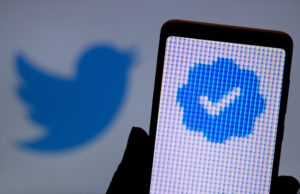Diving is an important skill in soccer. No one has touched you, but, like a toddler throwing a tantrum, you throw yourself on the ground and cry out in faux agony, usually while clutching a body part such as your knee or ankle. If you do it right, the referee will think there has been a serious foul and penalize the opposing team. It’s not fair play, but it’s part of the game.
Diving is part of the game of politics as well, and Massachusetts Senator Ed Markey is a master. On Veteran’s Day (11 November) this year, he sent Twitter owner Elon Musk a letter howling over “a fake Twitter account in my name.” And it had a blue check! Imagine! It was Veterans Day, but poor Senator Markey was so triggered by a misplaced blue check that he could muster no more than an embarrassingly perfunctory thank-you tweet for our veterans. Yes, yes, we appreciate your sacrifice. But a blue check, his blue check, was on the wrong account! “That is unacceptable,” he sniffed.

Markey’s letter to Musk was skillful political diving. Twitter’s blue-check error was quickly corrected, and no harm came to Markey or his career. The account was created by a Washington Post reporter who acted “with the permission of a U.S. senator, Edward J. Markey.” Far from triggered, Markey was likely delighted by the opportunity to throw himself on the political floor and cry out in faux agony over Twitter’s “removal of safeguards against disinformation.”
There is one big difference between diving in soccer and diving in politics. In politics, the diving player is also the referee. And sensitive Senator Markey is calling the foul on Musk. His letter demands, “Twitter must explain itself.” The good (at diving) Senator demanded that Musk answer a series of questions by 25 November. The questions read more like threats. “What was Twitter’s process for issuing paid-for blue checkmark verification of a Twitter account?” “Specifically, did Twitter fail to follow its internal policies for paid verification, and, if so, which ones?” And so on. Adding farce to comedy Markey got the date wrong by 20 years. He growls, “Please respond to the following questions in writing by November 25, 2002.” Without the aid of a time machine, Musk will find it difficult to respond to Markey’s demand.
Markey tweeted out the letter croaking, “Twitter must explain how this happened and how to prevent it from happening again.” Elon Musk demonstrated proper contempt for Markey’s letter by responding, “Perhaps it is because your real account sounds like a parody?” This was too much for the sensitive Senator. As if to eliminate any doubt that this is a shakedown Markey answered Musk’s snark, “One of your companies is under an FTC consent decree. Auto safety watchdog NHTSA is investigating another for killing people. And you’re spending your time picking fights online. Fix your companies. Or Congress will.” Those are some nice companies you got there, Mr. Musk. Be a shame if somethin’ should happen to them.
Markey’s march on Musk is being conducted under that banner of fighting “disinformation.” But his real motives are not hard to guess. Diving is deception. And the good (at diving) Senator Markey’s pretense of fighting disinformation is deception. His goal is to decide for you what you are to believe. If he can to that, he gets to stay in power. “Disinformation” is an empty word and a bogus bogey held up to hide this dishonorable end. The first and highest freedom is freedom of speech. We must not let them take it from us. We should honor those who gave their last full measure of devotion to defend freedom by fighting for freedom from domestic oppression, including Senator Markey’s assault on free speech. Let the blue checks fall where they may.
Roger Koppl is Professor of Finance in the Whitman School of Management of Syracuse University and Associate Director of Whitman’s Institute for an Entrepreneurial Society (IES).
Abigail Devereaux is a Research Fellow at the Institute for the Study of Economic Growth and Assistant Professor of Economics in the W. Frank Barton Business School at Wichita State University.


READER COMMENTS
nobody.really
Dec 1 2022 at 11:12am
I can only imagine the interview process for becoming an author on this blog: “Yeah, yeah, all that econ stuff; blah, blah. But how good are you at finding clever topical metaphors to illustrate larger societal issues?”
I’ve objected when I find the metaphors misleading; that’s the risk of trying to be clever. But when it works, it works. This one seems spot on–topical, apt, and funny! Nicely done.
Walter Boggs
Dec 1 2022 at 11:19am
As a longtime Econlog reader and fan, I’m struggling to understand how this post got published here.
steve
Dec 1 2022 at 12:45pm
Not really getting the point of this post. If I pay my $8/month and I still have people misusing my name to put out false tweets I shouldn’t worry about it? Its wrong to criticize Twitter or is it Musk?
Steve
Roger Koppl
Dec 1 2022 at 1:16pm
We said, Markey’s “goal is to decide for you what you are to believe.” I’m for free speech and the First Amendment. Senator Markey? Not so much. That’s our main gripe; Markey wants to control speech.
Monte
Dec 1 2022 at 10:58pm
Ah yes! Ed Markey, team player and “intentional foul” guy running interference for his party and the FTC in an effort to trip up Musk’s Twitter and put the muzzle back on free speech. What else should we expect from someone who joined the National Guard in order to avoid the draft during the Vietnam War.
David Henderson
Dec 2 2022 at 5:03pm
Good point. On your last sentence, though, I take issue. You wrote:
I don’t know what to expect. He could have done it because he opposed the war. Or he could have done it because he favored the war but didn’t want to go to war. Either reason is legitimate when the government uses force to get soldiers. What wouldn’t be legitimate is if he did this and then favored, or favors, the draft. Does he favor the draft?
Monte
Dec 2 2022 at 8:55pm
Valid counter, Dr. Henderson. I should not have assumed any particular motive on Senator Markey’s part. He did oppose the war, as many young men did, who also sought refuge within the National Guard rather than evading the draft illegally.
Vietnam was, in the final analysis, an immoral and illegal war. I guess it’s a matter of conscience as to whether avoiding it at any cost should be considered an immoral or illegal act.
Comments are closed.